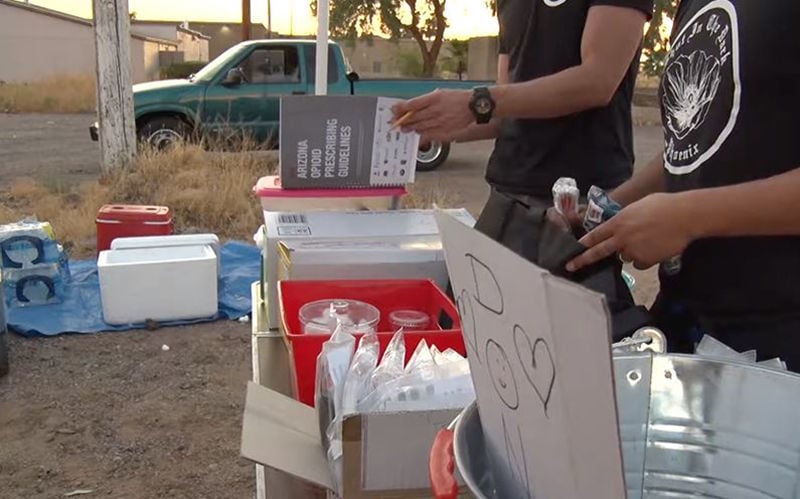PHOENIX – While the debate around laws that would allow clean needle exchange programs to operate legally in Arizona continues, one organization continues working in a legal gray area to help stop the spread of disease.
Shot in the Dark is a nonprofit that provides drug users with clean needles, educational materials, treatment referrals and more. The organization is operated by those who have seen the impact of opioid abuse on communities.
Volunteer Jonathan Martinez said Shot in the Dark is intent on helping addicts manage their drug habit in a safer way. “It doesn’t matter what laws are in place and it doesn’t matter what people say,” he said. “People are going to use drugs if they want to use drugs, right?”
Arizona undoubtedly is facing an opioid crisis.
According to the Arizona Department of Health Services, the state has recorded 23,949 suspected opioid overdoses and 3,400 suspected opioid deaths from June 15, 2017, to Aug. 1, 2019.
Shot in the Dark and other syringe-access programs aren’t specifically outlawed, but they do violate Arizona’s drug paraphernalia laws.
The programs offer clean syringes to counter a culture of sharing needles, which increases the spread of infections.
“We have a drug crisis in our state, but we also have a crisis in the areas of HIV spreading and hepatitis B spreading,” said state Rep. Tony Rivero, R-El Mirage.
A 2016 study by the Centers for Disease Control and Prevention found a correlation between the rise of opioid addiction and cases of acute hepatitis B in Kentucky, Tennessee and West Virginia. Arizona’s health department has reported 25 cases so far in 2019 after logging 30 total in 2018.
Rivero has introduced a syringe access bill each of the past two legislative sessions.
The bill would legalize the operation of needle-access programs, but Rivero said lawmakers are still hesitant.
“I think part of the issue for policymakers is the concern about a perception that we’re saying, ‘Go do more drugs,’” he said. “That we’re pushing people to do drugs, and that’s not the case.”
Cathy, a Shot in the Dark volunteer from Mesa who did not want her last name used, said legalization of syringe-access programs is crucial to the organization’s work. “It’s something that is so needed in the community, and I keep hoping that our Legislature will actually legalize this because I know we’re operating in a bit of a gray area,” she said.
A CDC review of 15 studies of clean-needle programs found that they were associated with decreases in the prevalence of HIV and hepatitis C and decreases in the incidence of HIV.
Negative perceptions of needle programs, combined with the legal ambiguity surrounding them, present challenges for Shot in the Dark. Two weeks ago, volunteers were asked to leave an exchange site by the manager of a nearby commercial property.
It wasn’t the first time.
“We have been kicked out of so many places in the past year and a half, and just my site, you know, we’ve been moved around a lot,” said Martinez, who was operating in the parking lot of a business center in Mesa.
Shot in the Dark said Arcadia Management Group, the property manager, asked them to leave. Cronkite News reached out to Arcadia for comment, but they declined. In addition to public backlash, funding for Shot in the Dark is drying up while the program hangs in legal limbo.
“We’re not funded by the government. We’re not funded by the state. We’re definitely not funded by the county,” Martinez said. The program operates almost entirely through donations given by participants and community members.
Rivero said he firmly believes his proposed bill would help a complicated, confusing situation. “It legalizes the needle-exchange program so that people who are using drugs could go to a nonprofit, exchange their dirty needle for a clean one,” he said. “But beyond that, this is an opportunity for nonprofits to engage people who have drug addiction problems and direct them to programs that can help them get off drugs.”
His bill has passed in the House but not the Senate.
For now, Shot in the Dark and other needle programs are left to continue working in the legal shadows.
“They help a lot of people,” supporter Nichole Boockoff said. “It’s not just with helping them with new syringes or water. It’s support. They listen to you … They’re there for you. And a lot of people on the streets, that’s what they need.”
Cathy, the volunteer from Mesa, said Shot in the Dark provides help to people who are often overlooked.
“They just want someone to meet them where they are,” she said. “To listen to their stories. To support them in what they’re trying to do. Nobody … says, ‘Hey, I want to be a drug addict when I grow up.’”
Maricopa County Attorney Bill Montgomery has not taken a public stance on syringe-access programs. Officials responded to Cronkite News with the following: “Please note this office did not take part of any conversations tied to any proposals in the last legislative session and took no position on those proposals. Through previous statements on needle exchange programs you will find Mr. Montgomery feels the best approach to the issues surrounding substance abuse is to focus first on prevention through education and awareness and then drug treatment.”





